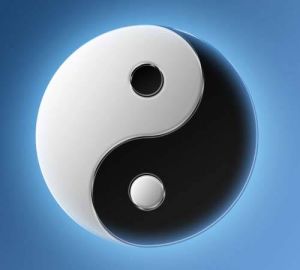Difference between revisions of "Yi jing"
imported>Superleila (Created page with ''''''Yi''''' (易,周易''Book of Changes'', or ''I Ching''), or '''''Yi jing'''''易经, appeared during the transition from the Shang Dynasty to Zhou. The book uses a...') |
imported>Ciic |
||
| Line 2: | Line 2: | ||
In the book, many opposing categories are recorded, such as auspicious and inauspicious, good luck and ill luck, big and small, entry and exit, incoming and outgoing, forward and backward, up and down, taking and giving, life and death, internal and external, safety and danger, profit and loss. These opposing categories mean the whole world is replete with contradictions. And the world is composed of contradictions that interchange and interact. Something big is sure to come after something small has gone; a plain may rise to become a hillside; present time is a continuation of the past. There is nothing at all that is unchangeable and steady forever in the world. Everything has its own contradiction(s). Everything changes from its own contradiction(s). This outlook on the world may be regarded as the early beginning of the study of dualism, or opposites (dialectics). | In the book, many opposing categories are recorded, such as auspicious and inauspicious, good luck and ill luck, big and small, entry and exit, incoming and outgoing, forward and backward, up and down, taking and giving, life and death, internal and external, safety and danger, profit and loss. These opposing categories mean the whole world is replete with contradictions. And the world is composed of contradictions that interchange and interact. Something big is sure to come after something small has gone; a plain may rise to become a hillside; present time is a continuation of the past. There is nothing at all that is unchangeable and steady forever in the world. Everything has its own contradiction(s). Everything changes from its own contradiction(s). This outlook on the world may be regarded as the early beginning of the study of dualism, or opposites (dialectics). | ||
| + | [[File:yijing.jpg|thumb|]] | ||
| + | |||
[[category:literature]] | [[category:literature]] | ||
Latest revision as of 01:53, 18 June 2010
Yi (易,周易Book of Changes, or I Ching), or Yi jing易经, appeared during the transition from the Shang Dynasty to Zhou. The book uses arrangements of eight trigrams (three solid and/or broken lines forming patterns which represent Heaven, Earth, thunder, wind, water, fire, mountain and lake) through which natural and social changes can be foretold.
In the book, many opposing categories are recorded, such as auspicious and inauspicious, good luck and ill luck, big and small, entry and exit, incoming and outgoing, forward and backward, up and down, taking and giving, life and death, internal and external, safety and danger, profit and loss. These opposing categories mean the whole world is replete with contradictions. And the world is composed of contradictions that interchange and interact. Something big is sure to come after something small has gone; a plain may rise to become a hillside; present time is a continuation of the past. There is nothing at all that is unchangeable and steady forever in the world. Everything has its own contradiction(s). Everything changes from its own contradiction(s). This outlook on the world may be regarded as the early beginning of the study of dualism, or opposites (dialectics).
